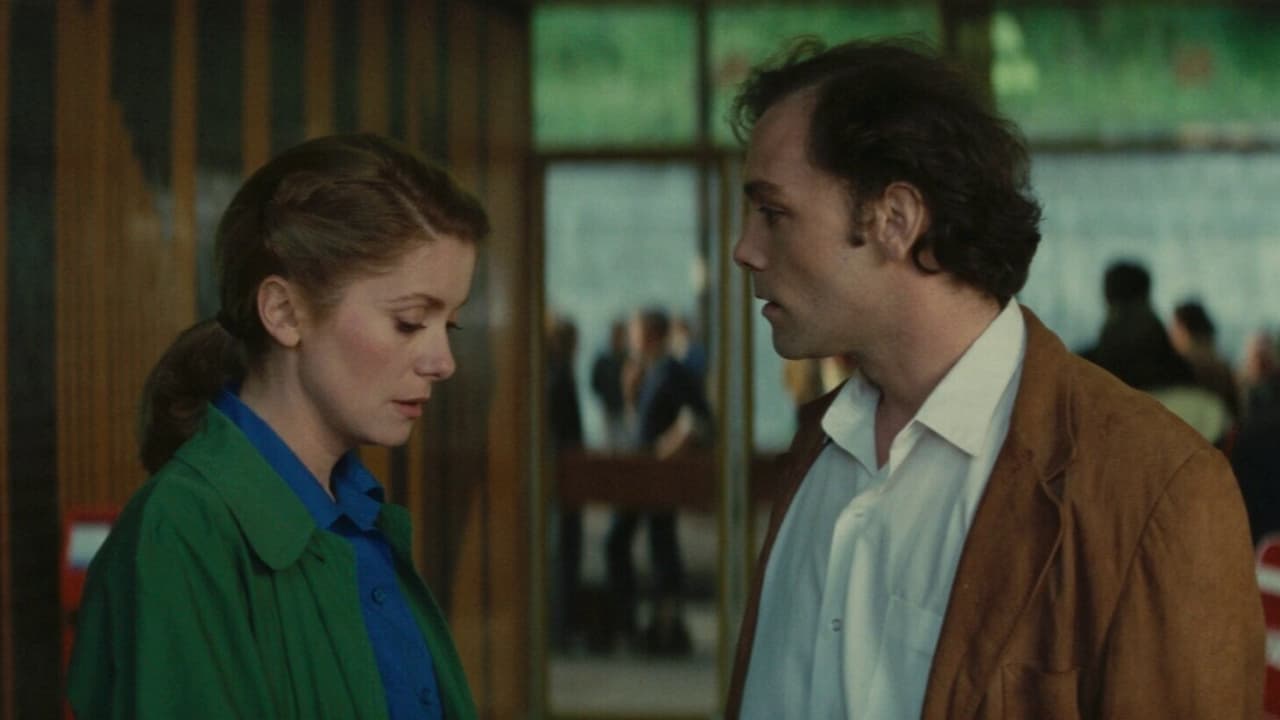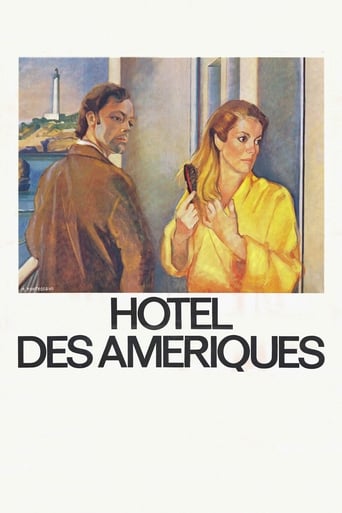

This review contains spoilers ! Helene is sad and distant because she has not recovered from the demise of her architect boyfriend. One night, she met Gilles, an aimless guy who is a part time tourist guide, living in his mother's hotel. Helene is attracted to Gilles but she cannot open up to him yet. The attraction is mutual. However, Gilles seems frustrated that Helene is not ready to fully commit to him. If only he were more patient, one can see that Helene is slowly opening up. She changed her hairstyle and there is more color to her face. She even took Gilles to her real house, not just her rented apartment. Despite their feelings for each other, Helene's personal baggage and Gilles lack of maturity threaten their relationship. Gilles friend, Benard, is no help. He is a loser who tries his best to make Gilles feel guilty. One wonders if Helene is attracted to Gilles partly because she is looking for someone who needs her. Gilles is like a boy who has not grown up emotionally and has not taken on the responsibilities of an adult. For example, Gilles younger sister has the full time job of helping their mom run their hotel. I think this film is about the complexities of human relationships and how lack of maturity and communication can lead to despair and depression.
... View MoreWow, did I have a bad night. I usually love French films and was excited to watch a DVD with two of Catherine Deneuve's films ("Le Sauvage" and "Hôtel des Amériques"). Amazingly, both of the films were among the least interesting films I have seen in some time--mostly because of the terrible writing. This is sad because one of the big reasons I usually prefer French films to recent Hollywood films is the writing, but in these two films they simply created characters that were hard to care about or understand.Deneuve plays Hélène, a lady who obviously is in mourning for a dead lover. She can't get on with her life. However, when she meets Gilles (Patrick Dewaere), they become lovers--even though there really is absolutely no chemistry between them...none! As for Gilles, he seems very moody and is good friends with a guy who loves to steal and beat up gay people. Now this could have been interesting, as this gay protest could have been an indication that Gilles and his male friend were lovers or harbored sexual feelings for each other. This may have turned off some viewers, but it really would have seemed plausible and interesting. Instead, however, you just assume that since Gilles likes such an evil man that he, too, is a jerk. And, through the course of the film, he does nothing to change that opinion. In fact, as the film progresses he gets moodier and moodier--until you are ready to shout at the screen for him to get over it and stop sulking and be a man!Deneuve's character is rather interesting at first. The idea of her having all this emotional baggage and being constricted when it came to love was interesting. However, she is so distant and so moody that you wonder why Gilles puts up with her. Sure, he's pretty but this is the only thing he could see in her. Heck, their sex lives weren't even good...so why does he stay? And, why doesn't she either grow or simply reject him completely because she refuses to give in to love? Instead, she and the audience are stuck in limbo. While the movie is only 93 minutes long, it seems like a lifetime, as these two just exist and the relationship is stuck in neutral--and there is absolutely no coherent reason for them to be together in the first place or remain together.Overall, impossible to believe and dull. I can think of many, many films Ms. Deneuve made that are better...and none, off the top of my head, that were worse.
... View MoreThis may be Téchiné's first distinctively personal work. 'Hôtel des Amériques' is a rueful, disconcerting film whose central theme is the doomed relationship of two people, both distracted and hopeless, who aren't right for each other and don't know where they're going. Not altogether surprisingly, they meet as the result of a car crash in which one almost runs over the other. That's a good sign of where things are headed.All this happens in Biarritz, city of tourists and gamblers, a place one character says is not quite France but not quite anywhere else. It's another character in the film, alienating yet still romantic and, of course, a place where one might win big. At least it's a good place for a hotel. But the irony of the hotel is that when its owner returns from making a lot of money in Mexico he modernizes it and it becomes soulless and the cozy, voluptuous French "petits déjeuners" with strong coffee, crisp bread and big pats of butter are replaced by packaged "American breakfasts" deemed trendy and appealing to foreign guests.Gilles (Patrick Delawaere, excellent and troubling here) is an engaging but disastrous loser, poetic but seedy, who's mistakenly devoted to a pseudo-artistic petty criminal named Bernard (Etienne Chicot) whom he met when both were sojourning in New York. Bernard is really a very unpleasant man, a liar and would-be serial seducer who pretends his songwriting is important; he can't even make money as a street musician. Both men live in the hotel of Gilles' mother, who runs the place along with his younger sister, a heavy reader who never goes out but is madly in love with a man who once stayed one night at the hotel.The woman who almost kills Gilles with her car at the outset of the film is Hélène (Catherine Deneuve), an anesthesiologist adrift after the death of an older man, an architect whom she loved and who left her a large decrepit villa he had planned to restore, in which they were already living. She has moved now to a studio apartment with an ocean view when she hits Gilles and he latches onto her and won't let go. She's so lonely she accepts him, but she can't really love him and it would be impractical to do so. The circle is completed by Rudel (François Perrot), a doctor Hélène knew in medical school who once was her lover; he's a compulsive gambler whom Hélène appeals to for some sort of stability. He turns out to be the one Gilles' sister fell in love with.This is one of Téchiné's odd assortments of interconnected people; you can see the same thing going on in his 2007 'The Witnesses.' In 'Wild Reeds'/'Les roseaux sauvages', another of Téchiné's best films, the composition is simple: just a girl and two boys, one of whom is gay and the other bisexual.Also emerging in this film is the gay element that's ever-present in the director's best work, usually with gay people and straight people who are friends and someone bisexual who links them all physically, like the bi- Vice Squad chief played by Sami Bouajila in 'The Witnesses'/'Les Témoins', who's madly in love (and in lust) with Manu (Johan Libéreau), the boy who dies a tragic early AIDS victim, but who also loves his beautiful wife, Emmanuelle Béart, the frustrated children's book author who is to write their saga as a novel with Manu's true confessions at its center.Obviously linking seemingly disconnected people through variable sexualities is essential to Téchiné's way of composing a film. In 'Hôtel des Amériques' the dilemma isn't as clear as in 'Wild Reeds.' Bernard may be bisexual and Gilles may be in love with him as well as Hélène. Certainly he's torn between them, and Bertrand's heterosexual boasting may be a pose. The gay post office worker Luc (Jean-Louis Vitrac) is attracted to Bernard. Bernard rejects Luc but falls back upon him in desperation when his life is a shambles. Jacques Nolot, the filmmaker, plays a tough gay leatherman who tries to beat up Bernard in a cruising area. This was Nolot's first film role, and he runs the whorehouse hotel occupied by Manu and his sister in 'Les Ténoins.' Meanwile he has become highly respected latterly for his own few wry, boldly unguarded, autobiographical films. He wrote the scenario for Téchiné's 'I Don't Kiss' (1991), whch contains autobiographical elements for both him and the director.'Hôtel des Amériques' was a turning point for Téchiné. He has said that from then on he no longer made genre films, and this was the beginning of a fruitful collaboration with Deneuve, six films together so far (2009). With a gay sensibility, Téchiné has worked with the most beautiful actresses in French cinema, including Emmanuelle Béart and Juliette Binoche. This 1981 Deneuve is icy cold, as she tended to be when young, but later she uses her iciness to be engagingly annoying for Arnaud Desplechin (in Kings and Queen and A Christmas Tale), showing these two auteurs don't find her perfection at all off-putting, and rightly so: ice-queen Deneuve has blossomed into a woman who has depths and can be humorous and almost cuddly.The thing is that whether you like 'Hôtel des Amériques' or not, and I find it unsatisfying, you can see in it how Téchiné came to find himself through working not from genres or from movies but from life and in particular from the quirks of his characters and their interactions. This explains his reliance on "l'imprévu," the element of the unforeseen, the improvised, with accidents and pickups in bars or cruising areas determining story arcs and relationships.
... View MoreGilles is sponging off his mother, who runs a small hotel in a French coastal city. When he meets Helene, she takes over the job of mothering him, even treating his minor wounds at the hospital one night when he gets into a fight. Gilles's other passionate relationship is with Bernard, a self-absorbed, mediocre singer-guitarist who can't stay out of trouble with the law. Bernard's true passion is probably for Luc, the gay man he beats up in a washroom.It's beautifully made; sometimes I thought I was watching a Carne film with Michele Morgan instead of Catherine Deneuve. Bruno Nuytten was the cinematographer; there's no one better for moody night scenes. Philippe Sarde's music is full-blown romantic, sometimes too much so. Techine doesn't bother with character development through plot, he just assumes that whatever passes in front of his camera is telling the story. Those casino scenes go nowhere, and the effort to bring Helene's dead lover's architectural plans to life is wasted, since it's just another occasion for Gilles to look hangdog and helpless.All in all, it left me wondering about Techine's willingness to engage the viewer in the film's material. I walked out of Barocco many years ago, and Soeurs Bronte left me pretty much cold, although I admired the acting. Hotel des Ameriques doesn't seem to be about anything, and the characters are cardboard.
... View More